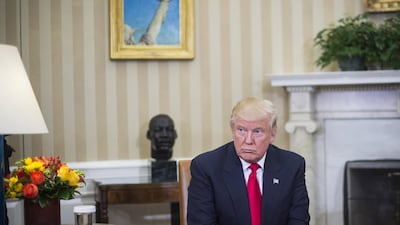Several realistic potential future scenarios for the new US administration of Donald Trump are already discernible.
First, he could simply govern as an essentially traditional Republican conservative. A Rust Belt troika already embedded in the administration, representing areas that gave him the presidency – Mike Pence, the vice president elect; Reince Priebus, White House chief of staff; and Paul Ryan, speaker of the House of Representatives, – may ensure that the Trump agenda is practically indistinguishable from this, perhaps with an atypical infrastructure stimulus package.
Second, his administration could be an utter failure and end in chaos, resignation or impeachment.
Third, Mr Trump could play out, at the national level, the kind of “rogue” leader persona of lesser past American politicians who shared his populist, demagogic style such as Louisiana’s Huey Long or Boston Mayor James Curley.
But a fourth prospect is that, if and when he faces extreme difficulties, Mr Trump has the personality and the instincts for an unprecedented American presidential authoritarian gambit.
This has been obvious since the early stages of the campaign, and only got worse as the election approached. Mr Trump has a deeply patriarchal, authoritative and authoritarian attitude towards how things ought to be run. In his family, his business, and now the country at-large, he casts himself as the pater familias, big daddy, whose word by natural right should be law.
Should Mr Trump’s presidency start failing, or for some other reason he takes a distinctly authoritarian turn, the standard expectation is that he would seek inspiration from the international strongman he has most frequently and greatly admired, Russia’s Vladimir Putin.
This is wholly mistaken. Not only is this approach totally unworkable in the US, with its strong institutions and deep democratic traditions, Mr Putin’s version of contemporary authoritarianism is totally unsuited to Mr Trump’s potential political conundrum.
Mr Putin’s basic appeal to Russians, like that of many other international right-wing authoritarians, has been national unity and order. He promised to unite Russians and give them a sense of national purpose, security and unity.
Instead, the model more suited to an American authoritarian gambit by Mr Trump is, ironically, one that emerges, at least theoretically, from the far left: the late Hugo Chavez of Venezuela.
Chavez never sought or promised to unify Venezuela. On the contrary, he ruled through chaos and division, openly and literally dividing Venezuelan society into classes A, B, C and D, according to descending levels of wealth and urbanity. Having done this, Chavez always and only spoke to and for categories C, the urban proletariat, and, even more, D, the peasants.
Mr Trump is preaching American unity now, but his road to power was more divisive, and the election results of 2016 more divided along class, education and geographical lines, then anything in recent, and perhaps all of, US history.
Were he to attempt an authoritarian gambit, Mr Trump would have no choice but to return to the divisions that brought him to office and champion the rural and exurban white working-class against all other Americans, just as Chavez did in Venezuela.
Venezuela’s weak but extant democratic institutions were generally no match for Chavismo during his rule. This won’t be true for most American institutions, but there is one low hanging fruit Mr Trump has already identified and which he could effectively pursue first if he decides to combine his demagoguery with authoritarian tactics to try to salvage his power or position. The free press in the US is protected partly by the first amendment to the Constitution, and partly by landmark Supreme Court rulings such as the 1964 New York Times Co versus Sullivan case. These are relatively secure and supported by conservatives and liberals alike.
But the media relates to the presidency through convention and tradition rather than anything formal or requisite.
Mr Trump demonstrated his antipathy towards the media throughout the campaign, and has continued it since, with additional bizarre, angry tweets.
The surest sign that Mr Trump is taking an authoritarian turn – and the red flags and warning signals for this potential are, alas, completely unmistakable – would be an all-out attack on press freedom. He could abolish the White House press pool, revoke credentials for critical media and insist on trading even minimal access for positive coverage. He could try to weaken libel law protections, as he has vowed, and otherwise harass and intimidate reporters.
The media is the canary in the coal mine.
If Mr Trump begins effectively attacking the core institutions of press freedom in the name of the rural, white and working-class “American people”, and pitting them against the multicultural urban and educated “elites,” the United States will surely be headed towards its greatest constitutional crisis in 150 years.
Hussein Ibish is a senior resident scholar at the Arab Gulf States Institute in Washington
On Twitter: @ibishblog


